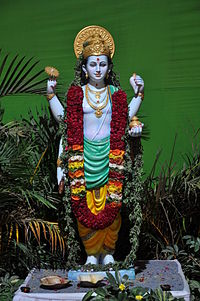What is Ayurveda?
Ayurveda (Sanskrit: आयुर्वेद): Ayurveda, “the knowledge for long life”; or ayurvedic medicine is a Hindu system of traditional medicine native to India and a form of alternative medicine. The earliest literature on Indian medical practice appeared during the Vedic period in India, i.e., in the mid-second millennium BCE. The Susruta Sa?hitaand the Charaka Sa?hita, encyclopedias of medicine compiled from various sources from the mid-first millennium BCE to about 500 CE, are among the foundational works of Ayurveda. Over the following centuries, ayurvedic practitioners developed a number of medicinal preparations and surgical procedures for the treatment of various ailments. Current practices derived (or reportedly derived) from Ayurvedic medicine are regarded as part of complementary and alternative medicine. It is a holistic Indian system of medicine that uses a constitutional model. It works to provide a flexible guidance to attain a state of positive health. Its treatment and techniques is also flexible for people with health challenges.

Safety concerns have been raised about Ayurveda, with two U.S. studies finding about 20% of Ayurvedic treatments contained toxic levels of heavy metals such as lead, mercury and arsenic. Other concerns include the use of herbs containing toxic compounds and the lack of quality control in Ayurvedic facilities
Ayurveda is derived from two Sanskrit root words: Ayu, which means Life, and Veda, which means the Knowledge. Thus Ayurveda refers to the Science of life.
The ancient rishis or seers of truth, discovered truth by means of religious practices & disciplines. Through intensive meditation, they manifested truth in their daily lives. Ayurvedic system of health is conversance of practical, philosophical & religious experiences of great sages.
Ayurveda is a fine blend of Science, Religion & Philosophy as well. We use the word religion to denote philosophical perceptions and discipline in conduct through which, the doors of perception open to all aspects of life. Through its scientific approach to human life, Ayurveda works to harness the intricate abilities of human body and mind. With its philosophical approach to human life, Ayurveda preaches us to recognize ourselves as miniscule component of this magnificent universe.
The physiological and pharmacological concepts of Ayurveda are structured in “whole- someness”. Therefore, the Ayurvedic description of “human body” and the “drugs” are dealt from a holistic plane. Even their “interface” is identified from a holistic perspective.
History of Ayurveda
One view of the early history of ayurveda asserts that around 1500 BC, ayurveda’s fundamental and applied principles got organized and enunciated. In this historical construction, Ayurveda traces its origins to the Vedas, Atharvaveda in particular, and is connected to Hindu religion. Atharvaveda (one of the four most ancient books of Indian knowledge, wisdom and culture) contains 114 hymns or formulations for the treatment of diseases. Ayurveda originated in and developed from these hymns. In this sense, ayurveda is considered by some to have divine origin. Indian medicine has a long history, and is one of the oldest organised systems of medicine. Its earliest concepts are set out in the sacred writings called the Vedas, especially in the metrical passages of the Atharvaveda, which may possibly date as far back as the 2nd millennium BC. According to a later writer, the system of medicine was received by Dhanvantari from Brahma, and Dhanvantari was deified as the god of medicine. In later times his status was gradually reduced, until he was credited with having been an earthly king named Divodasa.
Underwood & Rhodes (2008) hold that this early phase of traditional Indian medicine identified “fever (takman), cough, consumption, diarrhea, dropsy, abscesses, seizures, tumours, and skin diseases (including leprosy)”.Treatment of complex ailments, including angina pectoris, diabetes, hypertension, and stones, also ensued during this period. Plastic surgery, couching (a form of cataract surgery), puncturing to release fluids in the abdomen, extraction of foreign elements, treatment of anal fistulas, treating fractures, amputations, cesarean sections, and stitching of wounds were known. The use of herbs and surgical instruments became widespread. The Charaka Samhita text is arguably the principal classic reference. It gives emphasis to the triune nature of each person: body care, mental regulation, and spiritual/consciousness refinement.
Other early works of ayurveda include the Charaka Samhita, attributed to Charaka. The earliest surviving excavated written material which contains references to the works of Sushruta is the Bower Manuscript, dated to the 6th century AD. The Bower manuscript is of special interest to historians due to the presence of Indian medicine and its concepts in Central Asia. Vagbhata, the son of a senior doctor by the name of Simhagupta, also compiled his works on traditional medicine. Early ayurveda had a school of physicians and a school of surgeons. Tradition holds that the text Agnivesh tantra, written by the sage Agnivesh, a student of the sage Bharadwaja, influenced the writings of ayurveda.
Total Experience
OPD/yr
IPD/yr
Satisfaction
Most Asked
Frequently Asked Questions
Opening Time
-
Monday - SaturdayMorning 10:00 am - 02:00 pm Evening 07:00 pm - 08:00 pm
-
SundayMorning 10:00 am - 02:00 pm Evening Closed
